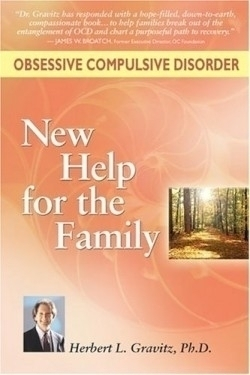Obsessive Compulsive Disorder
New Help for the Family
“Trauma (is) a crucible for developing excellence … through which we turn life’s wounds into gifts.” Sustaining that positive note throughout, Gravitz offers a guidebook for the families of those suffering from obsessive-compulsive disorder (OCD), a book as poetical as it is practical.
A licensed psychologist experienced in dealing with families of alcoholics, Gravitz believes that the families of people with OCD are too often overlooked in the treatment. His extensive experience with homes in crisis enables Gravitz to anticipate the questions, feelings and problems encountered by the OCD family. Yet, as specific as it is to this disorder, one in which fearful and repetitive thoughts rule a person’s life, the book would be helpful to any family afflicted by chronic illness or to professionals interested in a concise, informative and highly
readable text.
Gravitz’s desire to educate and encourage is reflected in every aspect of the book—from organization to style. The eight chapters are arranged in a question and answer format for convenience; even the footnotes are in “unobtrusive superscript” to accommodate both readers and researchers.
Chapters are packed with useful information, providing details about the disease as well as support for those undertaking the journey toward recovery. The book’s final chapter offers practical steps and recommended routes (from setting boundaries to setting appointments with therapists) for family members to put into practice. Two invaluable appendices are included: one, a list of places to go for help, including telephone and fax numbers, e-mail and website addresses; the other, an annotated bibliography. A list of cited references follows.
Drawing from an portfolio of approaches, Gravitz balances out the harsh truths of OCD with heartfelt encouragement. He leavens his writing with quotes from Sartre to Eldridge Cleaver and aptly uses metaphors to illustrate his points: he compares OCD to a roller coaster, a wind blowing through the family, a wave—even an interactive video. His readers learn that while OCD can devastate, it can also be a means to propel families toward “higher levels of growth.” The book’s reassuring message to family members is that taking care of themselves is just as important as taking care of the loved one with OCD, making the book a testament to the belief that the truth at the end of any journey ultimately sets all involved free.
Reviewed by
Judy Hopkins
Disclosure: This article is not an endorsement, but a review. The publisher of this book provided free copies of the book to have their book reviewed by a professional reviewer. No fee was paid by the publisher for this review. Foreword Reviews only recommends books that we love. Foreword Magazine, Inc. is disclosing this in accordance with the Federal Trade Commission’s 16 CFR, Part 255.

